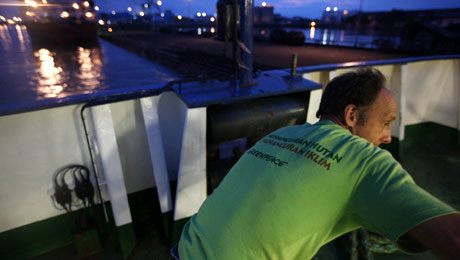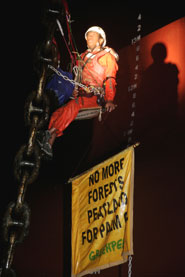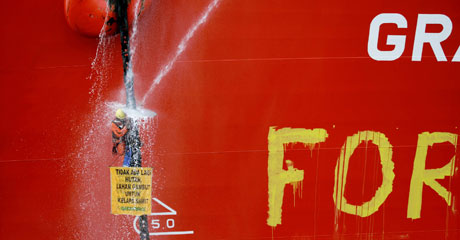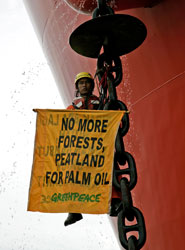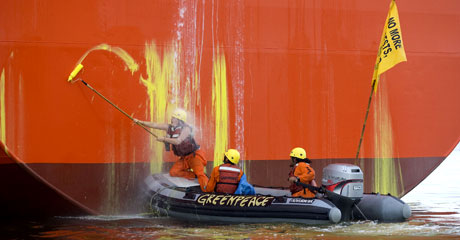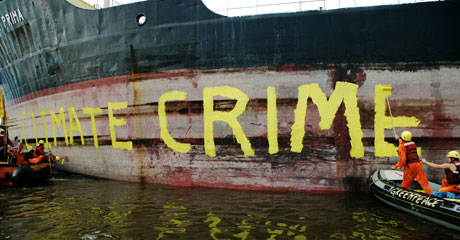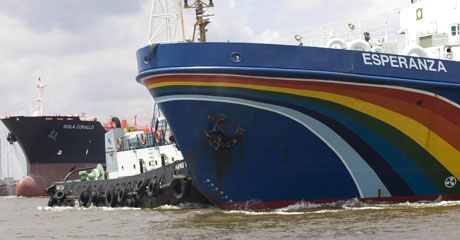
The Esperanza attempts to slip past a tug as the Isola Corallo comes in to dock © Greenpeace/Rante
I had thought that, after the Esperanza nipped into the berth reserved for the Isola Corallo this morning, we’d have some time to rest (and, in my case, a long shower) and prepare for the inevitable visit by the authorities. It didn’t quite work out like that and by mid-morning, events were moving rapidly.
The other ship alongside the dock had departed and was replaced by a big barge which was brought right up to the Esperanza’s stern to hem us in. With the Corallo preparing to come in (the request for a pilot to guide the ship in had been picked up over the radio), it became clear that the port authorities were preventing us from moving up the berth.

Standing on the mooring line © Greenpeace/Novis
There was little option but to pull in the mooring lines and attempt to move the Esperanza around the barge. A sizeable crowd had gathered on the dock and one angry man performed a little direct action of his own by standing on the last mooring line. A couple of the crew tried to persuade him to move but he wasn’t going anywhere. The only solution was to cut the line and the ship was free.
However, two tugs were waiting for us and the three ships entered a bizarre, slow-motion ballet – the Esperanza trying to move back alongside, and the tugs pushing us in the opposite direction. Meanwhile, the Corallo was steaming towards the dock and it became a race against time for the captain to evade the tugs and place the Esperanza in the way of the incoming tanker. Nail-biting isn’t really the word.
But we were outnumbered and although the Esperanza and the Corallo passed within a few tens of metres of each other, the tugs wouldn’t let the ship go and forced us back out into the harbour. So, disappointing that we were unable to continue the blockade for longer, but we achieved an awful lot in the time that we had.
Not least because, apart from all the national and international coverage we’ve had this week, there has been a sudden eagerness on the part of Sinar Mas, the agribusiness company behind the palm oil shipment we’ve just been blocking, to talk to our campaigners. Last night, Bustar spoke to Daud Dharsono, president director of Sinar Mas: when challenged about the deforestation his company is perpetrating, his response was, “It’s only a small area.”
However, Dharsono has agreed to a meeting at next week’s meeting of the Roundtable on Sustainable Palm Oil, but he has been promised that we won’t halt our exposes and actions until Sinar Mas publically backs a moratorium on deforestation in Indonesia. (Don’t forget, you can write to Susilo Bambang Yudhoyono, president of Indonesia, to demand a moratorium as well.)

Cutting the mooring lines © Greenpeace/Novis
Speaking of which, two inflatables laden with paint recently left the Esperanza, bound for the Corallo. I just checked through the binoculars from the bridge and the water is raining down from hoses on the Corallo’s deck, but the hull has ‘Forest Crime’ and ‘Climate Crime’ written across it.
